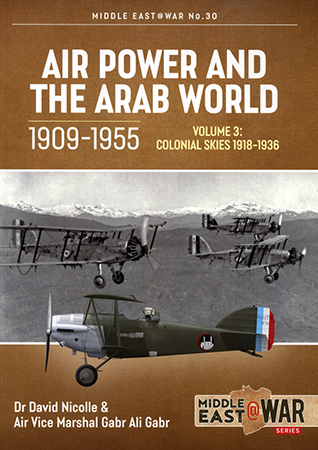
Air Power and the Arab World 1909-1955, Volume 3 Book Review
By David L. Veres
| Date of Review | June 2021 | Title | Air Power and the Arab World 1909-1955, Volume 3 |
|---|---|---|---|
| Author | David C. Nicolle, with Gabr Ali Gabr | Publisher | Helion |
| Published | 2021 | ISBN | 9781913336325 |
| Format | 96 pages, softbound | MSRP (USD) | $29.95 |
Review
With Gabr Ali Gabr, David Nicolle continues his illuminating and informative Air Power and the Arab World series with Volume 3: “Colonial Skies 1918-1936” – 30th in Helion’s superb “Middle East@War” series.
Available in North America from Casemate, contents divide into three parts.
The first explores conventional Spanish, French, and Italian operations to 1936. The second surveys colonial policing actions. And the third recaps Iranian and Ethiopian air forces – inspiration, the author avers, to Arabs seeking to forge their own air arms.
Contents chronicle equipment, tactics, deployments, personnel, and politics. And revelations pepper pages.
Coverage of Spanish amphibious operations at Al Hoceima, for instance, proved intriguing – and, given larger World War II actions two decades later, surprisingly prescient. And I can’t wait for details of the Rif Republic air force in Volume 4!
As for fighting in Morocco, did you realize that France briefly reconstituted the legendary “Lafayette Squadron” of American volunteers to serve in the Rif campaign? Neither did I!
Helion’s picture-packed production sports dozens of rare photos and archival images. Twenty-one color profiles sample the sweep of British, French, Italian, Spanish, Iranian, and Ethiopian warplanes and schemes. And maps put coverage into geographic context.
But if I recall my Arabic, “wilayat” [“wilAyat”] is already plural: no need to add an “s”. Conversely, “wilayah” [“wilAyah”] is the proper singular – not “wilayat”.
Moreover, that’s an Iranian Polikarpov R-5 – not R-1 – on page vii. And those don’t look like R.E.8s on page 71.
Nicolle also translates both “Qa’im-Maqam” and “Bimbashi” as “Lt. Col.” within the same page 45 paragraph. What’s the difference?
Additionally, Anthony Quinn – not Oliver Reed – portrayed Umar Mukhtar in the movie “Lion of the Desert”. Reed played Italian Gen. Rodolfo Graziani.
Finally, the lack of annotations again handicaps readers seeking additional details or context. Nicolle’s rather robust reference lists – and occasional notes within text – thankfully suggest source clues.
None of these concerns irreparably diminishes this Air Power and the Arab World installment. And I eagerly await Volume 4.
Recommended!
My sincere thanks to Casemate for this review sample!







